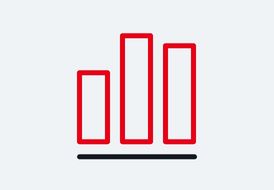Law and contracts
Delayed vehicle deliveries and vehicle defects can lead to operating difficulties in regional and long-distance transport. In regional transport, this may result in contractual violations or non-compliance toward the contracting organizations. Higher expenses, penalty payments and lower fares are the result. Ensuing damage claims are asserted against the manufacturers.
In addition, risks, in particular from warranty and other liability provisions, may also arise from other contractual relationships. This relates, for example, to the sale of companies, real estate or other material assets.
Provisions have been made for existing legal and contractual risks based on an assessment of their probability of occurrence.
Compliance with current laws, company guidelines and recognized regulatory standards is the task and duty of every DB Group employee. It is the mission of our compliance department to ensure compliance with such criteria.
With its very high procurement volume and about 20,000 suppliers, DB Group is one of the largest purchasers in Germany. Large-scale capital expenditures mean that the infrastructure business units in particular are exposed to a significant risk of becoming the target and victim of corruption, cartel agreements or fraud. As a provider of grants, the Federal Government places high demands on DB Group with its anti-corruption guidelines.
Opportunities arise from the discovery of cartels that operated in the past and the enforcement of claims for damages against cartel members. DB Group is seeking compensation for damages in over ten cases. This relates, amongst other issues, to cartels in trucks, cars (known as the car cartel and emissions scandal), tracks, air freight, elevators and escalators, prestressing of steel, and girocard. In more than ten other cases, DB Group is still determining if damage has been caused. DB Group has developed an innovative antitrust screening tool, which has been in use since early 2022. Since then, the tool has identified conspicuous patterns in pricing or bidding behavior and can provide valuable information on illegal supplier agreements. The results in the first year were promising: in 2022, more than 2,500 ongoing or new tenders were screened using this automated digital method. A second assessment was carried out for 120 tenders. In one case the suspicions were confirmed, resulting in a report to the German Federal Cartel Office. DB Group is in discussions with various competition authorities and the OECD on this new approach to antitrust prevention and detection.
There are also risks associated with ongoing proceedings (national authorities or the European Commission) against companies in DB Group or the Federal Republic of Germany, the outcome of which and the potential consequences of which are not yet foreseeable.


